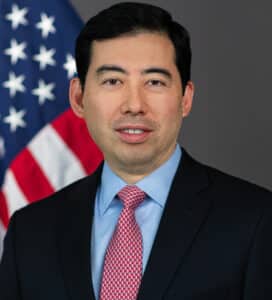Artificial intelligence is a potential boon to financial advisors and their clients, not a menace, says Securities and Exchange Commission member Mark Uyeda, who opposes a proposed SEC rule on the technology.
Speaking at the fall meeting of the North American Securities Administrators Association on Sept. 10, Uyeda said science-fiction-inspired scenarios predicting calamity from increasing use of the technology are unfounded.

“While some may have a fearful vision of artificial intelligence, such as Stanley Kubrick’s film 2001: A Space Odyssey where a sentient computer system called the HAL 9000 murders a number of astronauts, current technology has a multitude of benefits for the markets and the financial services industry,” he told the NASAA.
The SEC should take steps to understand and monitor AI use by financial advisors, said Uyeda, who earlier this year voted against a proposed SEC rule on AI.
SEC seeks to regulate AI
The proposed regulation would require broker-dealers and investment advisors to eliminate conflicts of interest caused by their use of AI that place the firm’s interests ahead of the investor’s. Firms would also be required to have written policies and procedures to prevent violations and achieve compliance with the rules.
The SEC’s July 26 vote unveiling the proposal was 3-2, with Uyeda and a fellow Republican commissioner voting no. Uyeda said the proposal is too broad, covering virtually any investor interaction, and may cause firms to avoid innovation, according to the July SEC meeting minutes. The SEC is accepting comments on the proposed rule until Oct. 10.
Speaking at the September NASAA session, Uyeda said regulators should work with financial firms to understand how new technologies will be employed, learn the ins and outs of their use, and create appropriately tailored disclosures so investors can make informed decisions. The SEC should conduct roundtables, form advisory committees, and meet with industry experts to implement proper oversight of new technologies, he said. The SEC should also confer with state regulators, who often learn of problems first, he added.
AI just another innovation, Uyeda says
Artificial intelligence should be embraced as just the latest in a long line of technological advances that have powered the American financial industry, Uyeda told the audience at NASAA.
“From stock ticker machines, to the introduction of fax machines in 1964, to the computerization of order flow and introduction of electronic communication networks in the early 1970s, innovation has been at the forefront, and the U.S. financial markets have benefitted from these technological advances,” he said.
However, SEC Chair Gary Gensler said at the unveiling of the proposed rule in July that financial advisors could use AI to the detriment of clients.
“Today’s predictive data analytics models provide an increasing ability to make predictions about each of us as individuals,” Gensler said. “This raises possibilities that conflicts may arise to the extent that advisers or brokers are optimizing to place their interests ahead of their investors’ interests.”
Benefits for advisors, clients and regulators
Uyeda told NASAA that these concerns are overblown, and current laws and regulations are sufficient to deal with AI use by the financial industry.
“There are risks associated with these technologies, a number of which may be unknown, but I do not foresee AI-controlled robots marching through the streets in a quest for global domination,” he said. “However, a thoughtful regulator will consider methods for these risks to be mitigated, rather than prohibited.”
AI offers advantages for financial advisors, clients, and regulators, he said. Firms can use it to decrease operational costs, thereby reducing costs of investment advice and enhancing the ability of smaller financial firms to compete for market share, he said.
Additional Reading: Morgan Stanley Launching AI Tool for Advisors
AI technologies can be used by firms to detect suspicious activity, flag risk indicators, and identify patterns that may indicate fraudulent activities. AI can also help firms make accurate determinations of compliance violations, Uyeda said.
Regulators also stand to benefit, he said. He noted that financial institutions have significant reporting requirements, and regulators must sift through that mountain of data. AI can be used in the review of Exchange Act filings, FOCUS reports, and Form ADV filings, reducing the burden on regulators by helping to make sense of the information and identifying areas of risk and concern, he said. This could assist with policymaking decisions and prevent scenarios where evidence of a fraud slips through the cracks, he said.
“The late Steve Jobs said, ‘Innovation is the ability to see change as an opportunity – not as a threat.’ I have optimism that both federal and state regulators will see these emerging technologies as an opportunity for the financial markets and investors,” Uyeda said.
In a four-decade career in journalism, Ed Prince has served as an editor with many of New Jersey’s leading newspapers, including the Star-Ledger, Asbury Park Press and Home News Tribune.







